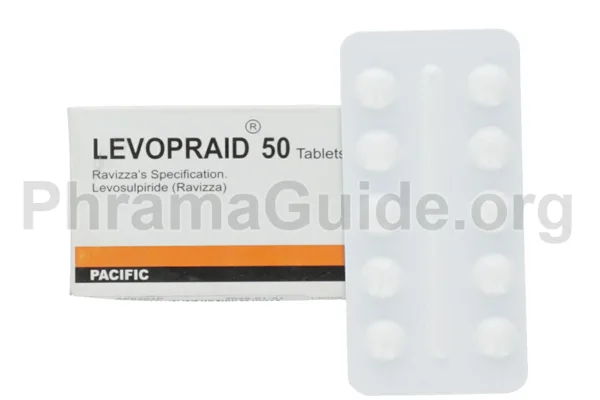Levopraid is a medication primarily used to treat gastrointestinal and psychiatric disorders. It acts as a selective dopamine D2 receptor antagonist and is sometimes used for its prokinetic (improving gastrointestinal motility) and antiemetic (preventing nausea and vomiting) properties. Common and less common side effects associated with Levopraid can include:
Common Side Effects
- Gastrointestinal Disturbances: Levopraid can cause common gastrointestinal side effects, such as diarrhea, constipation, abdominal pain, and bloating.
- Nervous System Effects: Some people may experience neurological side effects, including restlessness, anxiety, and insomnia. These effects are more likely at higher doses.
- Extrapyramidal Symptoms: Levopraid, like other dopamine antagonists, may lead to extrapyramidal symptoms such as tremors, rigidity, and akathisia (restlessness).
- Hyperprolactinemia: Levopraid can cause elevated levels of the hormone prolactin, which may lead to side effects like breast tenderness, breast enlargement (gynecomastia), or menstrual irregularities in both men and women.
Less Common Side Effects
- Tardive Dyskinesia: This is a rare but potentially serious side effect of dopamine antagonists like Levopraid. It involves involuntary, repetitive movements, especially of the face, mouth, and tongue. It may become irreversible in some cases.
- Neuroleptic Malignant Syndrome (NMS): Although rare, Levopraid can trigger NMS, a severe condition characterized by high fever, muscle stiffness, confusion, and autonomic dysregulation. NMS is a medical emergency.
- Allergic Reactions: Some individuals may experience allergic reactions to Levopraid, which can manifest as skin rashes, itching, and swelling.
- Cardiovascular Effects: Levopraid may rarely lead to changes in heart rate or blood pressure. It’s important to monitor for these effects, especially in individuals with pre-existing heart conditions.
- Liver and Blood Abnormalities: There have been reports of liver function abnormalities and changes in blood cell counts associated with Levopraid.
- Hormonal Imbalances: Beyond hyperprolactinemia, Levopraid may affect other hormones in the body, potentially leading to changes in libido, sexual function, and mood.

What is Levopraid?
Levopraid is one of the leading brands of Levosulpiride, manufactured and marketed by Pacific Pharmaceuticals Pakistan.
Levopraid : Available Formulations and Strengths
Presently, Levopraid is available in Tablet Form
Levopraid Tablets : 25mg and 50mg Strengths
What Are The Possible Drug Interactions of Levopraid?
- Antipsychotic Medications: Levopraid can enhance the effects of other antipsychotic medications, potentially leading to an increased risk of side effects, such as extrapyramidal symptoms and neuroleptic malignant syndrome (NMS).
- Dopaminergic Medications: Drugs that increase dopamine activity, such as levodopa (used to treat Parkinson’s disease), can interact with Levopraid. Levopraid’s dopamine antagonistic effects may counteract the action of these medications.
- Antidepressants: Certain antidepressants, particularly selective serotonin reuptake inhibitors (SSRIs), can interact with Levopraid and increase the risk of serotonin syndrome. This is a potentially serious condition characterized by symptoms like confusion, agitation, rapid heart rate, and high blood pressure.
- Sedatives and CNS Depressants: Levopraid may enhance the sedative effects of other drugs that depress the central nervous system, such as benzodiazepines, opioids, and sleep aids. Combining these drugs can increase drowsiness and impair coordination.
- Antihypertensive Medications: Levopraid may interfere with the blood pressure-lowering effects of antihypertensive medications. This interaction can lead to elevated blood pressure.
- Drugs that Prolong the QT Interval: Levopraid can prolong the QT interval on an electrocardiogram, which can lead to a potentially life-threatening heart rhythm abnormality. Avoid combining Levopraid with other medications that have a similar effect on the QT interval.
- Alcohol and Central Nervous System Depressants: The combination of Levopraid with alcohol or other substances that depress the central nervous system can enhance the sedative effects and impair coordination.
- Antacids and Proton Pump Inhibitors (PPIs): Some antacids and PPIs may affect the absorption of Levopraid. It’s generally recommended to take Levopraid on an empty stomach to optimize its effectiveness.
- Oral Contraceptives: Levopraid may reduce the effectiveness of oral contraceptives. Women using hormonal birth control should consider alternative methods of contraception.
- Digoxin: Levopraid can affect the absorption and clearance of digoxin, a medication used to treat certain heart conditions. Close monitoring may be necessary when using these drugs together.

Leave A Comment